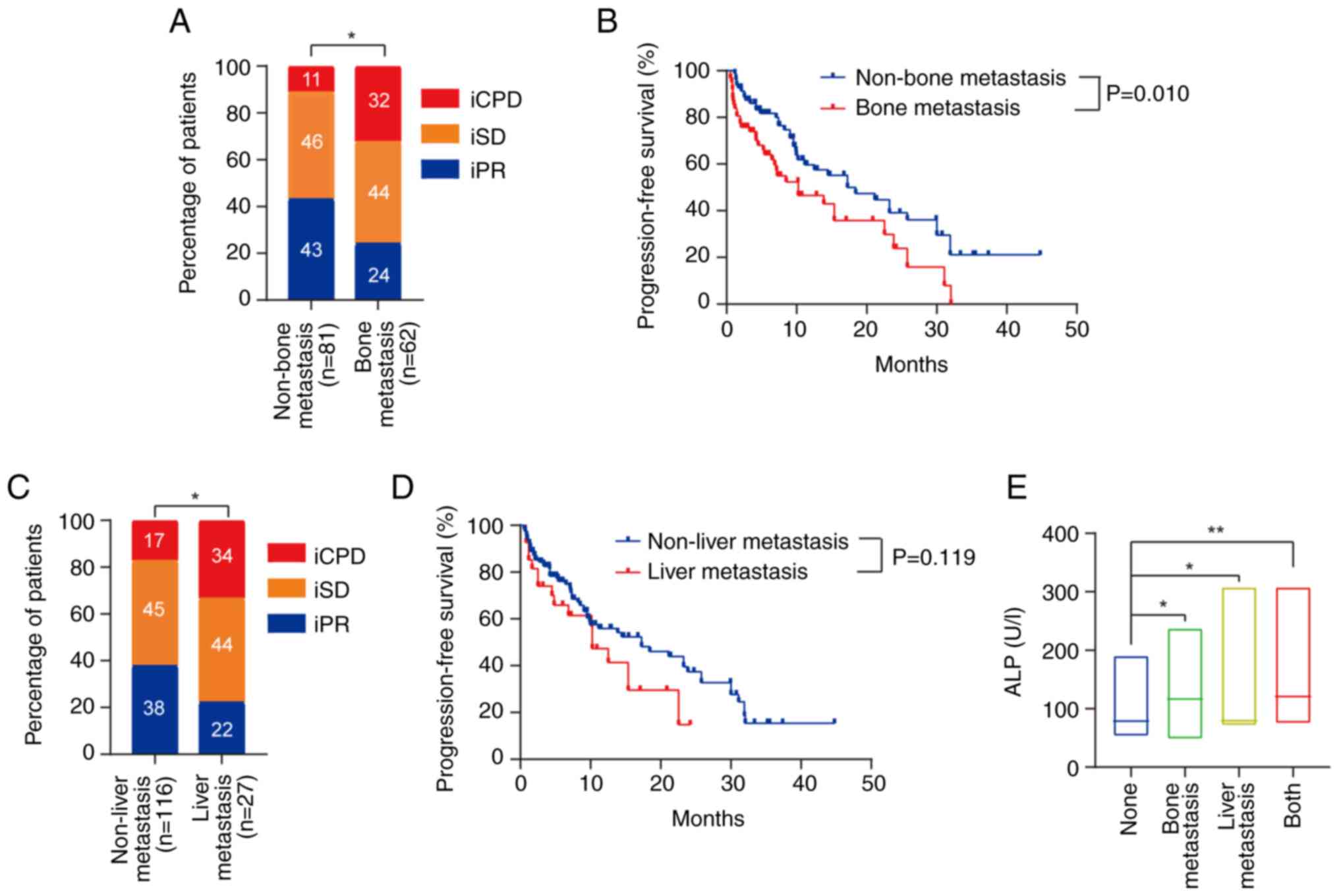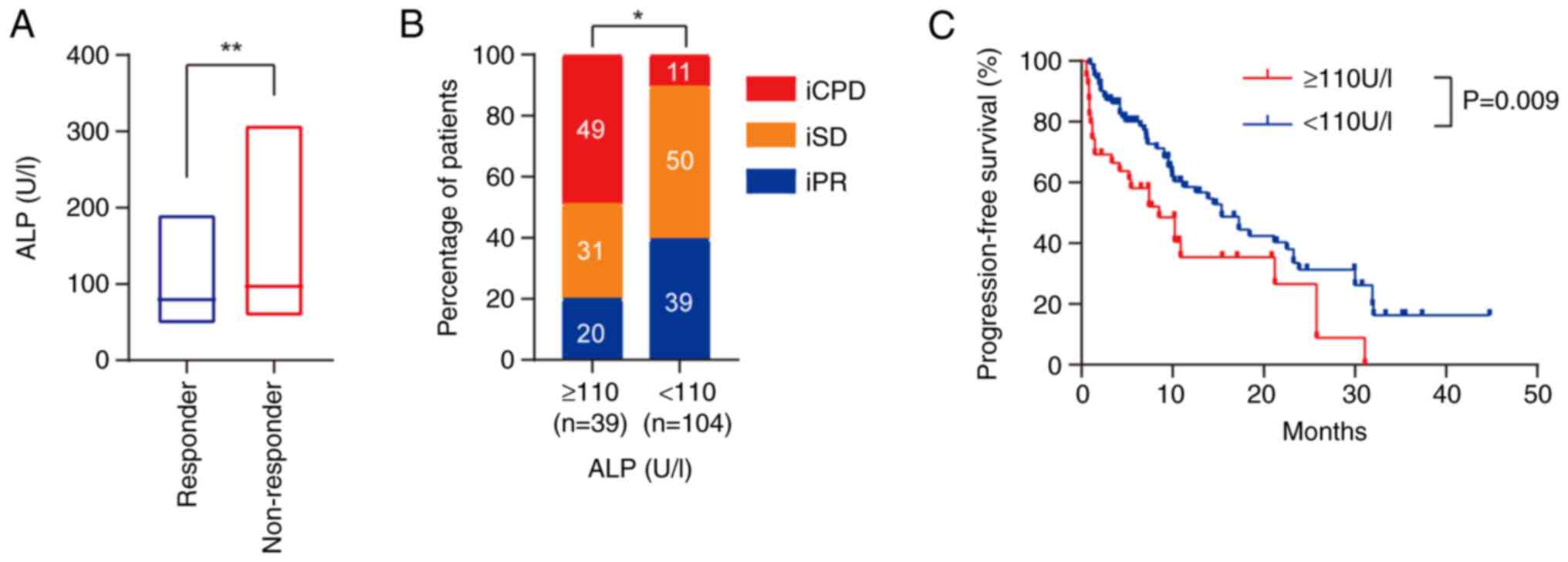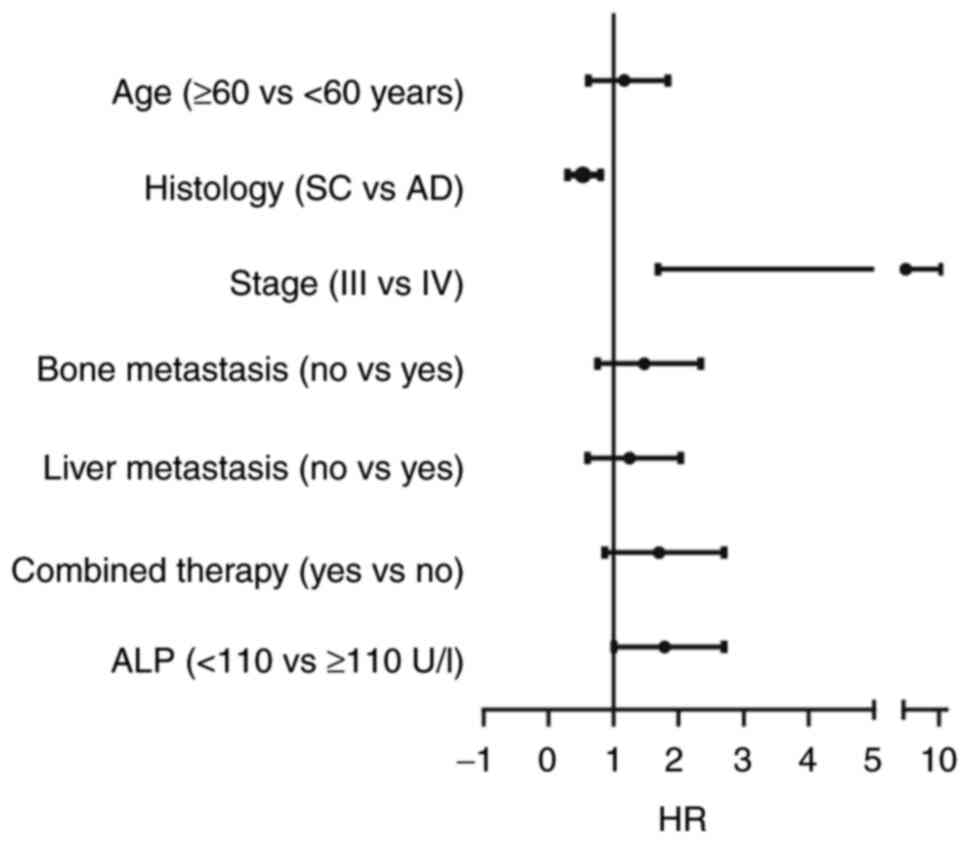|
1
|
Barta JA, Powell CA and Wisnivesky JP:
Global epidemiology of lung cancer. Ann Glob Health. 85:82019.
View Article : Google Scholar : PubMed/NCBI
|
|
2
|
Molina JR, Yang P, Cassivi SD, Schild SE
and Adjei AA: Non-small cell lung cancer: Epidemiology, risk
factors, treatment, and survivorship. Mayo Clin Proc. 83:584–594.
2008. View
Article : Google Scholar : PubMed/NCBI
|
|
3
|
Li T, Kung HJ, Mack PC and Gandara DR:
Genotyping and genomic profiling of non-small-cell lung cancer:
Implications for current and future therapies. J Clin Oncol.
31:1039–1049. 2013. View Article : Google Scholar : PubMed/NCBI
|
|
4
|
Socinski MA, Jotte RM, Cappuzzo F, Orlandi
F, Stroyakovskiy D, Nogami N, Rodríguez-Abreu D, Moro-Sibilot D,
Thomas CA, Barlesi F, et al: Atezolizumab for First-Line Treatment
of Metastatic Nonsquamous NSCLC. N Engl J Med. 378:2288–2301. 2018.
View Article : Google Scholar : PubMed/NCBI
|
|
5
|
Reck M, Rodriguez-Abreu D, Robinson AG,
Hui R, Csőszi T, Fülöp A, Gottfried M, Peled N, Tafreshi A, Cuffe
S, et al: Updated analysis of KEYNOTE-024: Pembrolizumab versus
platinum-based chemotherapy for advanced non-small-cell lung cancer
with PD-L1 tumor proportion score of 50% or greater. J Clin Oncol.
37:537–546. 2019. View Article : Google Scholar : PubMed/NCBI
|
|
6
|
Rodriguez-Abreu D, Powell SF, Hochmair MJ,
Gadgeel S, Esteban E, Felip E, Speranza G, De Angelis F, Dómine M,
Cheng SY, et al: Pemetrexed plus platinum with or without
pembrolizumab in patients with previously untreated metastatic
nonsquamous NSCLC: Protocol-specified final analysis from
KEYNOTE-189. Ann Oncol. 32:881–895. 2021. View Article : Google Scholar : PubMed/NCBI
|
|
7
|
Paz-Ares L, Vicente D, Tafreshi A,
Robinson A, Soto Parra H, Mazières J, Hermes B, Cicin I,
Medgyasszay B, Rodríguez-Cid J, et al: A randomized,
placebo-controlled trial of pembrolizumab plus chemotherapy in
patients with metastatic squamous NSCLC: Protocol-Specified final
analysis of KEYNOTE-407. J Thorac Oncol. 15:1657–1669. 2020.
View Article : Google Scholar : PubMed/NCBI
|
|
8
|
Socinski MA, Nishio M, Jotte RM, Cappuzzo
F, Orlandi F, Stroyakovskiy D, Nogami N, Rodríguez-Abreu D,
Moro-Sibilot D, Thomas CA, et al: IMpower150 final overall survival
analyses for atezolizumab plus bevacizumab and chemotherapy in
first-line metastatic nonsquamous NSCLC. J Thorac Oncol.
16:1909–1924. 2021. View Article : Google Scholar : PubMed/NCBI
|
|
9
|
Yarchoan M, Albacker LA, Hopkins AC,
Montesion M, Murugesan K, Vithayathil TT, Zaidi N, Azad NS, Laheru
DA, Frampton GM and Jaffee EM: PD-L1 expression and tumor
mutational burden are independent biomarkers in most cancers. JCI
Insight. 4:e1269082019. View Article : Google Scholar : PubMed/NCBI
|
|
10
|
Chang L, Chang M, Chang HM and Chang F:
Microsatellite instability: A predictive biomarker for cancer
immunotherapy. Appl Immunohistochem Mol Morphol. 26:e15–e21. 2018.
View Article : Google Scholar : PubMed/NCBI
|
|
11
|
Jiang P, Gu S, Pan D, Fu J, Sahu A, Hu X,
Li Z, Traugh N, Bu X, Li B, et al: Signatures of T cell dysfunction
and exclusion predict cancer immunotherapy response. Nat Med.
24:1550–1558. 2018. View Article : Google Scholar : PubMed/NCBI
|
|
12
|
Hurkmans DP, Kuipers ME, Smit J, van
Marion R, Mathijssen RHJ, Postmus PE, Hiemstra PS, Aerts JGJV, von
der Thüsen JH and van der Burg SH: Tumor mutational load, CD8(+) T
cells, expression of PD-L1 and HLA class I to guide immunotherapy
decisions in NSCLC patients. Cancer Immunol Immunother. 69:771–777.
2020. View Article : Google Scholar : PubMed/NCBI
|
|
13
|
Han J, Duan J, Bai H, Wang Y, Wan R, Wang
X, Chen S, Tian Y, Wang D, Fei K, et al: TCR repertoire diversity
of peripheral PD-1(+)CD8(+) T cells predicts clinical outcomes
after immunotherapy in patients with non-small cell lung cancer.
Cancer Immunol Res. 8:146–154. 2020. View Article : Google Scholar : PubMed/NCBI
|
|
14
|
Soyano AE, Dholaria B, Marin-Acevedo JA,
Diehl N, Hodge D, Luo Y, Manochakian R, Chumsri S, Adjei A, Knutson
KL and Lou Y: Peripheral blood biomarkers correlate with outcomes
in advanced non-small cell lung Cancer patients treated with
anti-PD-1 antibodies. J Immunother Cancer. 6:1292018. View Article : Google Scholar : PubMed/NCBI
|
|
15
|
Diem S, Schmid S, Krapf M, Flatz L, Born
D, Jochum W, Templeton AJ and Früh M: Neutrophil-to-Lymphocyte
ratio (NLR) and Platelet-to-Lymphocyte ratio (PLR) as prognostic
markers in patients with non-small cell lung cancer (NSCLC) treated
with nivolumab. Lung Cancer. 111:176–181. 2017. View Article : Google Scholar : PubMed/NCBI
|
|
16
|
Banna GL, Signorelli D, Metro G, Galetta
D, De Toma A, Cantale O, Banini M, Friedlaender A, Pizzutillo P,
Garassino MC and Addeo A: Neutrophil-to-lymphocyte ratio in
combination with PD-L1 or lactate dehydrogenase as biomarkers for
high PD-L1 non-small cell lung cancer treated with first-line
pembrolizumab. Transl Lung Cancer Res. 9:1533–1542. 2020.
View Article : Google Scholar : PubMed/NCBI
|
|
17
|
Siddique A and Kowdley KV: Approach to a
patient with elevated serum alkaline phosphatase. Clin Liver Dis.
16:199–229. 2012. View Article : Google Scholar : PubMed/NCBI
|
|
18
|
Vimalraj S: Alkaline phosphatase:
Structure, expression and its function in bone mineralization.
Gene. 754:1448552020. View Article : Google Scholar : PubMed/NCBI
|
|
19
|
Namikawa T, Ishida N, Tsuda S, Fujisawa K,
Munekage E, Iwabu J, Munekage M, Uemura S, Tsujii S, Tamura T, et
al: Prognostic significance of serum alkaline phosphatase and
lactate dehydrogenase levels in patients with unresectable advanced
gastric cancer. Gastric Cancer. 22:684–691. 2019. View Article : Google Scholar : PubMed/NCBI
|
|
20
|
Chen B, Dai D, Tang H, Chen X, Ai X, Huang
X, Wei W and Xie X: Pre-treatment serum alkaline phosphatase and
lactate dehydrogenase as prognostic factors in triple negative
breast cancer. J Cancer. 7:2309–2316. 2016. View Article : Google Scholar : PubMed/NCBI
|
|
21
|
Li D, Yu H and Li W: Albumin-to-alkaline
phosphatase ratio at diagnosis predicts survival in patients with
metastatic non-small-cell lung cancer. Onco Targets Ther.
12:5241–5249. 2019. View Article : Google Scholar : PubMed/NCBI
|
|
22
|
Ðokic-Lisanin M, Pantovic V, Jovanovic Z,
Samardz G and Jurisic V: Values of alkaline phosphathase and their
isoenzyme profiles in patients with cancer in respect to bone and
liver metastasis. Arch Oncol. 21:14–16. 2013. View Article : Google Scholar
|
|
23
|
Yu J, Green MD, Li S, Sun Y, Journey SN,
Choi JE, Rizvi SM, Qin A, Waninger JJ, Lang X, et al: Liver
metastasis restrains immunotherapy efficacy via macrophage-mediated
T cell elimination. Nat Med. 27:152–164. 2021. View Article : Google Scholar : PubMed/NCBI
|
|
24
|
Landi L, D'Inca F, Gelibter A, Chiari R,
Grossi F, Delmonte A, Passaro A, Signorelli D, Gelsomino F, Galetta
D, et al: Bone metastases and immunotherapy in patients with
advanced non-small-cell lung cancer. J Immunother Cancer.
7:3162019. View Article : Google Scholar : PubMed/NCBI
|
|
25
|
Detterbeck FC, Boffa DJ, Kim AW and Tanoue
LT: The eighth edition lung cancer stage classification. Chest.
151:193–203. 2017. View Article : Google Scholar : PubMed/NCBI
|
|
26
|
He S, Wang Y, Peng H, Yang L, Chen H,
Liang S, Lu L and Chen Y: Pretreatment alkaline phosphatase and
epstein-barr virus DNA predict poor prognosis and response to
salvage radiotherapy in patients with nasopharyngeal carcinoma and
metachronous bone-only metastasis. J Cancer. 8:417–424. 2017.
View Article : Google Scholar : PubMed/NCBI
|
|
27
|
Seymour L, Bogaerts J, Perrone A, Ford R,
Schwartz LH, Mandrekar S, Lin NU, Litière S, Dancey J, Chen A, et
al: iRECIST: Guidelines for response criteria for use in trials
testing immunotherapeutics. Lancet Oncol. 18:e143–e152. 2017.
View Article : Google Scholar : PubMed/NCBI
|
|
28
|
Pai-Scherf L, Blumenthal GM, Li H,
Subramaniam S, Mishra-Kalyani PS, He K, Zhao H, Yu J, Paciga M,
Goldberg KB, et al: FDA Approval Summary: Pembrolizumab for
treatment of metastatic non-small cell lung cancer: First-Line
therapy and beyond. Oncologist. 22:1392–1399. 2017. View Article : Google Scholar : PubMed/NCBI
|
|
29
|
Saxena P, Singh PK, Malik PS and Singh N:
Immunotherapy alone or in combination with chemotherapy as
first-line treatment of non-small cell lung cancer. Curr Treat
Options Oncol. 21:692020. View Article : Google Scholar : PubMed/NCBI
|
|
30
|
Sharma P, Hu-Lieskovan S, Wargo JA and
Ribas A: Primary, adaptive, and acquired resistance to cancer
immunotherapy. Cell. 168:707–723. 2017. View Article : Google Scholar : PubMed/NCBI
|
|
31
|
Isazadeh A, Hajazimian S, Garshasbi H,
Shadman B, Baghbanzadeh A, Chavoshi R, Taefehshokr S, Farhoudi
Sefidan Jadid M, Hajiasgharzadeh K and Baradaran B: Resistance
mechanisms to immune checkpoints blockade by monoclonal antibody
drugs in cancer immunotherapy: Focus on myeloma. J Cell Physiol.
236:791–805. 2021. View Article : Google Scholar : PubMed/NCBI
|
|
32
|
Bai R, Chen N, Li L, Du N, Bai L, Lv Z,
Tian H and Cui J: Mechanisms of cancer resistance to immunotherapy.
Front Oncol. 10:12902020. View Article : Google Scholar : PubMed/NCBI
|
|
33
|
Li YZ and Zhang HM: Recent advances in
primary resistance mechanisms against immune checkpoint inhibitors.
Curr Opin Oncol. 34:95–106. 2022. View Article : Google Scholar : PubMed/NCBI
|
|
34
|
Jiao S, Subudhi SK, Aparicio A, Ge Z, Guan
B, Miura Y and Sharma P: Differences in tumor microenvironment
dictate T helper lineage polarization and response to immune
checkpoint therapy. Cell. 179:1177–1190. –e13. 2019. View Article : Google Scholar : PubMed/NCBI
|
|
35
|
Qin BD, Jiao XD, Liu J, Liu K, He X, Wu Y,
Ling Y, Duan XP, Qin WX, Wang Z and Zang YS: The effect of liver
metastasis on efficacy of immunotherapy plus chemotherapy in
advanced lung cancer. Crit Rev Oncol Hematol. 147:1028932020.
View Article : Google Scholar : PubMed/NCBI
|
|
36
|
McKean WB, Moser JC, Rimm D and
Hu-Lieskovan S: Biomarkers in precision cancer immunotherapy:
Promise and challenges. Am Soc Clin Oncol Educ Book. 40:e275–e291.
2020. View Article : Google Scholar : PubMed/NCBI
|
|
37
|
Ramaswamy G, Rao VR, Krishnamoorthy L,
Ramesh G, Gomathy R and Renukadevi D: Serum levels of bone alkaline
phosphatase in breast and prostate cancers with bone metastasis.
Indian J Clin Biochem. 15:110–113. 2000. View Article : Google Scholar : PubMed/NCBI
|
|
38
|
Hu J, Yang S, Wang J, Zhang Q, Zhao L,
Zhang D, Yu D, Jin M, Ma H, Liu H, et al: Blood alkaline
phosphatase predicts prognosis of patients with advanced
HER2-negative gastric cancer receiving immunotherapy. Ann Transl
Med. 9:13162021. View Article : Google Scholar : PubMed/NCBI
|

















